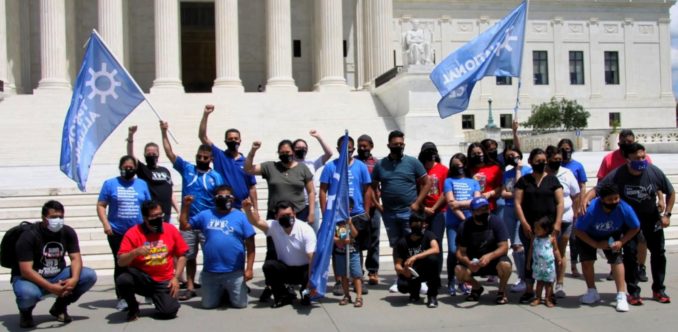On the Road to Justice with im/migrant TPS holders
By G. Lechat
Inspired by the great Civil Rights Movement and in solidarity with Black Lives Matter, immigrant Temporary Protected Status recipients organizing with Alianza TPS Nacional are forging a “Road to Justice.” This is the name they gave their 200+ car caravan that converged on Washington, D.C., June 23-24 to demand their overdue civil rights.
Protections including legal residency, work and driving authorizations are scheduled to end in January 2021. Without TPS or a path to permanent, legal residency, recipients and their families are vulnerable to dispossession and deportation.

Im/migrant TPS holders demand civil rights, June 24, Washington, D.C.
Of the total 320,000 recipients from 13 Brown and Black TPS countries in the Americas, Africa and the Middle East, close to 200,000 are from El Salvador. Most are in their 40s, with 20+ years’ worth of 18-month temporary residency extensions behind them. They are union members, business and home owners, and parents to many of the childhood arrivals who struggled for the DREAM Act — which would have granted them, but not their parents, full citizenship rights had it passed. Ultimately those youth either received Deferred Action for Childhood Arrivals (DACA) in 2012 or TPS; 68,000, or 22 percent of TPS-holders, arrived in the U.S. as minors.
The multinational Tepesana/os (as they are called in Spanish) also have 300,000 U.S.-born children, many of them activists for permanent residency in their own right. They know if their parents are deported, they could be separated from them, or forced to migrate with them to countries left dangerous and depressed by U.S. intervention.
Representing dozens of local Alianza-affiliated Comité groups, activist families drove to D.C. from almost every East Coast state, as well as Illinois, Texas, even California. Simultaneous rallies also took place in Western state capitals.. They called on the Senate to pass both the Dream and Promise Act and the Heroes Act, which respectively offer a citizenship path for qualifying DACA recipients and stimulus funds for all essential workers. Both of these bills were declared “dead on arrival” by the odious Senate Majority Leader Mitch McConnell.
Like DACA — a concession to the movement’s massive 2006 mobilizations that resuscitated May Day in the U.S., but a half-measure compared to the Dream Act — TPS status is legal but temporary. Trump terminated both programs early in his presidency. There has been an intensifying struggle ever since.
Legal action on behalf of TPS has been pending in the 9th Circuit Court since last summer. Proceeding faster, the Supreme Court’s DACA decision came last week. An estimated 800,000 DACA recipients could have been forced underground, but the June 18th restoration of the program by right-wing SCOTUS – put on the defensive by the BLM rebellion – signals hope for the TPS case in the lower court.
That said, all that has been won for DACA recipients and all that is possible for TPS recipients through the courts is preservation of their second-class status as temporary residents. This involves more surveillance, check-ins, thousands in fees, no welfare benefits or vote, and only short-term protections dependent on who rules.
TPS-holders renew militancy, demand legal #ResidencyNow
Initially the TPS-holders’ demand was simply “Save TPS.” But TPS workers have become emboldened for a number of reasons: their increasing alliance with the youth movement already burned by the death of their Dream Act, the callous dysfunction of governmental institutions, Trump’s vile racism, the routine of racist murder on U.S. streets and the unprecedented rebellion in response.
Their resurgent militancy was on full display in D.C.: “Residency Now,” “We Are Essential,” “BLM” and “F*ck 12” (new slang for cops), with only occasional reference to “Save TPS” and no support for any Democratic Party figures. No national politicians stepped forward to vocally support TPS recipients before they became the “heroes” — cleaning, driving, constructing, cooking and caring through the COVID-19 pandemic, facing risk and uncertainty — not even Bernie Sanders.
The demand has become permanent: legal #ResidencyNow. According to Alianza leader Marta Bonilla, the organization is now “calling for legal permanent residency for 11 million undocumented immigrants in this country as well as for TPS-holders.” This is a beautiful display of working-class solidarity and a significant political development!
Few personally embody this promise more than Bonilla, a leader of the Massachusetts Comité, who has continued organizing between her two jobs even after getting her citizenship when her daughter came of age last year: “When I started organizing for TPS it was because my union, UNITE HERE Local 26, asked me to, because they care about the members. They have donated money for our activities and supported the Comité.”
It has not been possible to estimate how many union members have TPS, but it is thought to be a very large percentage, especially for certain unions, binding the future viability of the labor movement to winning the struggle for permanent residency. Bonilla continued that supporters need to bring TPS and immigration issues to their unions: “What we would like to see more is for unions talking about TPS nationally, to members and in the news. It would be nice if they organized members to join us like when we were just in Washington.”
Solidarity is also welcomed by any kind of group reaching out to its closest Alianza chapter to offer support.

